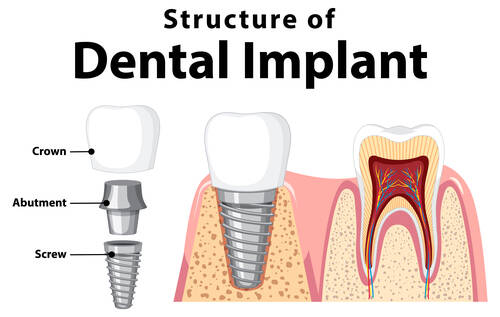
23 Jan The Long-Term Benefits of Dental Implants for Sustained Oral Health
Table of Contents
- Introduction to Dental Implants
- Why Choose Dental Implants?
- Benefits for Overall Oral Health
- Longevity and Durability of Implants
- Improving Self-Confidence
- Cost-Effective in the Long Run
- Minimal Ongoing Maintenance
- The Psychological Impact of Restored Teeth
Introduction to Dental Implants
In the area of dental restoration, dental implants in Rochester Hills have become a dependable and practical option for those experiencing tooth loss. These implants are crafted to imitate real teeth natural look and functionality, making them a respected choice among patients and dental professionals.
Dental implants are surgically inserted into the jawbone. They are constructed from high-quality titanium, well-known for its compatibility with human bone. Over time, these implants undergo osseointegration, which involves fusing with the bone to create a solid foundation that enhances their strength and efficacy.
This leads to a dental solution that boosts a smile’s aesthetic appeal and supports overall oral health and functionality, significantly improving patients’ quality of life.
Why Choose Dental Implants?
Dental implants are notable for their capacity to maintain the health and structural integrity of the jawbone. This crucial characteristic distinguishes them from other restorative options, such as dentures or bridges. The osseointegration process is essential in stimulating the jawbone, thereby preventing the bone loss that frequently occurs following tooth loss. Without this stimulation, the jawbone may weaken, resulting in a sunken facial appearance and potential misalignment of the adjacent teeth. Choosing dental implants allows patients to maintain their facial structure, ensure proper dental alignment, and minimize the likelihood of additional oral health complications.
Benefits for Overall Oral Health
- Improved Chewing Ability: Dental implants significantly improve chewing functionality, which can be compromised after losing a tooth. With implants, individuals can enjoy a wider variety of foods without limitations, promoting better nutrition and overall health.
- Speech Enhancement: Tooth loss can affect speech clarity, but dental implants offer support that helps restore stable and precise speech patterns. This improvement allows individuals to speak more confidently, personally and professionally.
- Better Oral Hygiene: Dental implant implants are independent replacements, so there is no need to alter surrounding teeth, unlike bridges, which require adjacent teeth for support. Maintaining good oral hygiene becomes more manageable with implants as they facilitate effective brushing and flossing, making good oral hygiene more manageable. Upholding a high standard of dental hygiene is crucial to averting gum disease and plaque accumulation, which could jeopardize both natural teeth and dental implants.
Longevity and Durability of Implants
A key reason many patients opt for dental implants is their exceptional durability. Titanium, the material used for implants, is strong and lightweight, allowing it to withstand the daily forces of biting and chewing. When maintained appropriately, dental implants have the potential to endure for a lifetime, offering a dependable option for individuals pursuing lasting oral health. Unlike dentures or bridges, which often require regular adjustments or replacements, dental implants necessitate minimal maintenance, leading to lower costs and reduced inconvenience related to repairs over time.
Improving Self-Confidence
The benefits of dental implants go beyond physical health—they also significantly improve mental health and emotional well-being. A beautiful, fully restored smile can significantly enhance self-esteem and social confidence. Dental implants aim to integrate seamlessly with natural teeth, creating a smile that is aesthetically pleasing and genuinely felt. Studies show that a restored smile can positively affect one’s overall quality of life, showing how potent dental implants can be in boosting confidence and mental health.
Cost-Effective in the Long Run
Though the initial cost of dental implants may be higher than dentures or bridges, they are a more cost-effective solution over time. Traditional dental prosthetics, including dentures, necessitate continuous maintenance, adjustments, and periodic replacements. Conversely, dental implants are intended as a long-term solution that requires minimal care following their integration. When evaluating the financial aspects, dental implants often provide a better return on investment due to their longevity, making them a smart choice for anyone considering long-term oral health solutions.
This dentist in Orlando FL also adds that dental implants help preserve jawbone density by stimulating bone growth, which prevents the bone loss commonly associated with missing teeth. This added benefit reduces the need for future corrective treatments, further enhancing their cost-effectiveness over time.
Minimal Ongoing Maintenance
- Regular Brushing and Flossing: Adopting a consistent oral care routine is vital for preserving the health and longevity of dental implants. Aim to brush your teeth at least twice daily, using a soft-bristled toothbrush and fluoride toothpaste to effectively remove food particles and plaque. Pair this with daily flossing to navigate between your teeth and around the implants, which helps prevent gum disease and promotes the overall health of your gums. This diligent care keeps your implants stable and enhances your smile’s appearance.
- Routine Dental Visits: Regular dental examinations and cleanings are essential for evaluating the health of your dental implants and the surrounding oral region. During these appointments, your dentist will perform comprehensive evaluations to detect any initial indications of issues, such as infections or instability, enabling timely intervention if required. Additionally, professional cleanings will eliminate tartar accumulation and maintain optimal oral hygiene, which plays a significant role in ensuring the long-term effectiveness and longevity of your implants.
- Avoiding Harmful Habits: It is essential to avoid harmful habits that may jeopardize the health of your natural teeth and dental implants. Chewing on complex objects—such as ice or pens—or smoking can adversely affect your oral health. By making thoughtful and well-informed decisions, you not only protect your implants but also improve the overall health of your dental framework, thereby ensuring that your smile stays vibrant and healthy for many years ahead.
The Psychological Impact of Restored Teeth
The impact of dental implants reaches far beyond the mere restoration of a smile; they fundamentally transform the lives of individuals. Numerous studies have documented the profound connection between oral health and self-esteem, revealing that many patients experience a remarkable boost in confidence and a significantly improved self-image after receiving dental implants. When a person with missing teeth regains a fully restored smile, they not only enhance their outward appearance but also elevate their inner feelings of self-worth and acceptance.
This newfound confidence can ripple through various aspects of life, influencing personal relationships by fostering more engaging interactions and encouraging a willingness to socialize. Additionally, it often opens doors in professional environments, as individuals carry themselves with greater assurance and poise, paving the way for career advancement and new opportunities.
In summary, dental implants serve as a remedy for tooth loss and a pathway to enhanced overall health and wellness. They provide long-lasting benefits that encompass the functionality of chewing and speaking and the aesthetic appeal of a confident smile. With their capacity to restore self-esteem and generate lasting financial savings, dental implants emerge as a holistic approach to maintaining and enhancing one’s oral health and quality of life.
More information:
———-
The information on MedicalResearch.com is provided for educational purposes only, and is in no way intended to diagnose, cure, or treat any medical or other condition.
Some links are sponsored. Products, providers and services are not warranted or endorsed.
Always seek the advice of your physician or other qualified health and ask your doctor any questions you may have regarding a medical condition. In addition to all other limitations and disclaimers in this agreement, service provider and its third-party providers disclaim any liability or loss in connection with the content provided on this website.
Last Updated on January 31, 2025 by Marie Benz MD FAAD

